10th Made in Maui County Festival boosts small businesses, local economy following fires : Maui Now
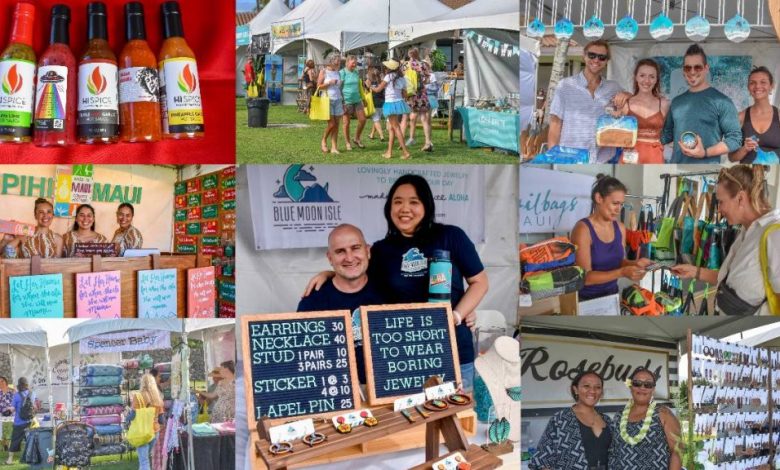
[ad_1]
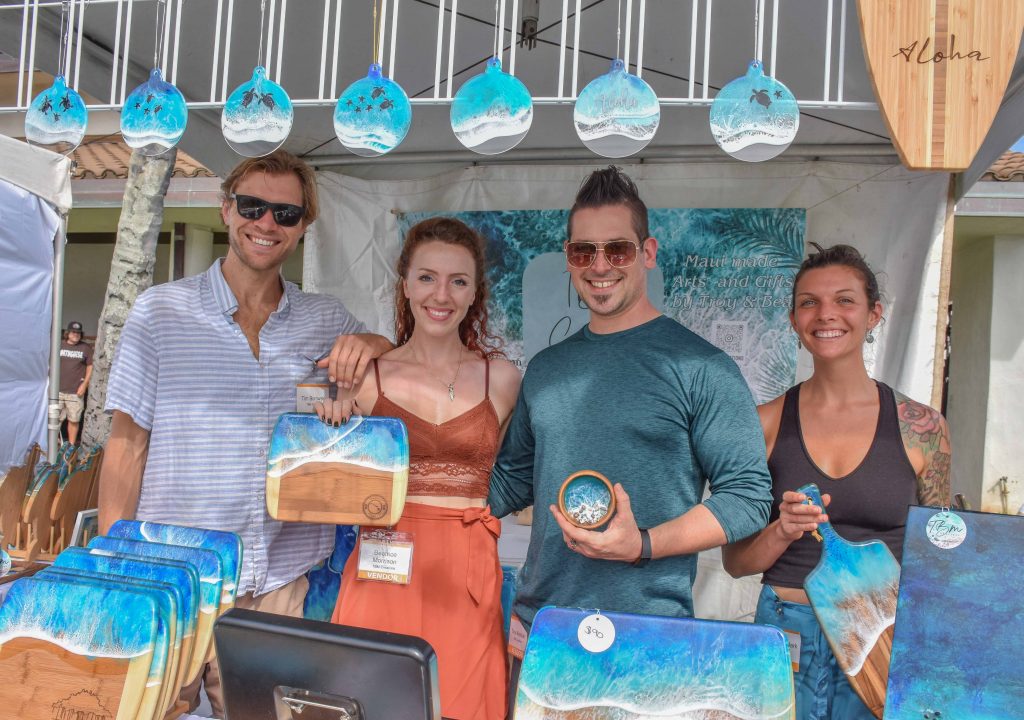
At the Hawaiian Airlines 10th Annual Made in Maui County Festival, every small business owner has a unique story. For married Troy and Bea Morrison of TBM Creations, it involves the COVID-19 pandemic and the Lahaina fire.
In 2020, when Bea Morrison lost her job at the front desk of the Hyatt due to the tourism shutdown, the couple began a side hustle creating custom art pieces — trinket dishes, cutting boards, skateboards, surfboards and ornaments — using Troy’s woodworking skills and Bea’s designs with epoxy resin and pigment in the colors of the beach and sea.
It quickly turned into a full-time business, with 80% of their sales at a prime pop-up location across the street from the well-known banyan tree. You know the rest. The Morrisons, like so many other companies that relied on Lahaina shoppers for sales, have had to pivot to survive.
“We really turned hard into online sales, focusing a lot on Etsy,” Troy Morrison said. “We’re also hoping this fair will get us some new contacts for wholesale buying.”
Pam Tumpap, president of the Maui Chamber of Commerce that runs the festival, said this year was always going to be special because it was the 10th anniversary.
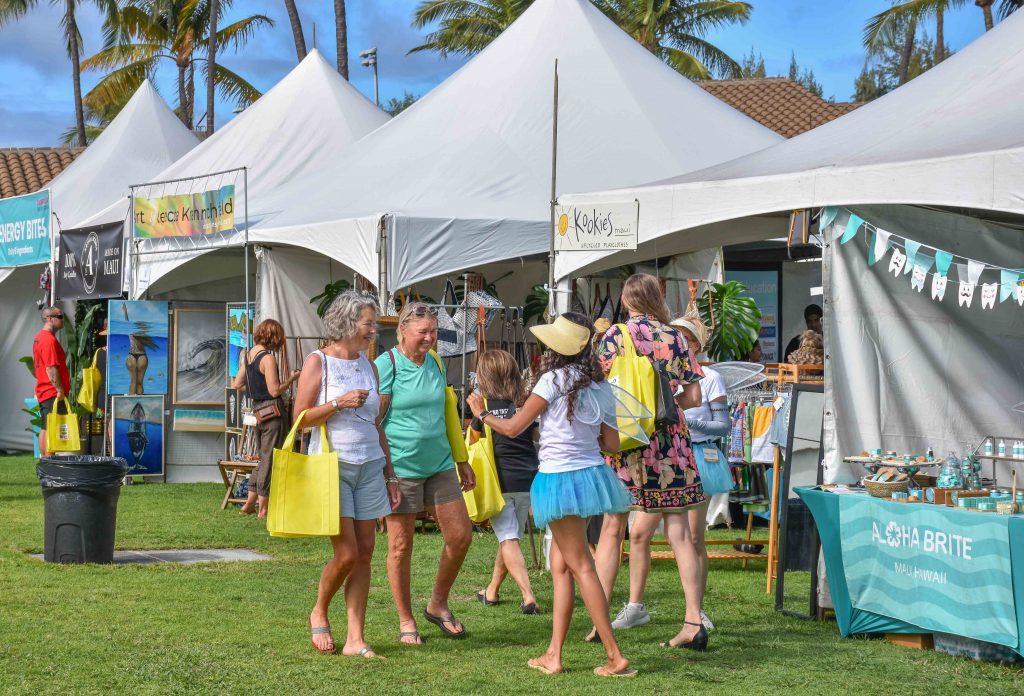
But with the Lahaina fire — that has led to the closure of about 600 businesses, according to the Hawai’i Small Business Development Center, and forced many others to change course — the festival on Nov. 3 and 4 has become a lifeline for some businesses and a symbol of economic recovery for Maui.
“Many of our vendors lost everything,” Tumpap said. “Then there has been the trickle-down effect of those businesses being lost in Lahaina, because it was such a retail mecca.”
With so much devastation, the Chamber of Commerce “did take time to pause” and listened to what the community needed and how the chamber could help, Tumpap said.
“But what we realized in listening to them — and knowing what this show has meant year after year and also what it meant during COVID for those companies who also counted on this show to help shore them up — was that the best thing we could do to help was this festival,” she said.
“It also gives us an opportunity to really show the strength of these small manufacturers, their resilience, their care for creating and sharing their products. It’s a real opportunity.”
This year, there are 131 vendors and 12 food trucks. They all went through a juried process, with the best of each category selected to participate. The Hawaiʻi State Department of Business and Economic Development also provided $450 to each vendor, which could be used to cover booth fees, which range from $350 to $500.
The timing of the festival has always been the first Friday and Saturday of November, when companies and shoppers gear up for the holiday season.
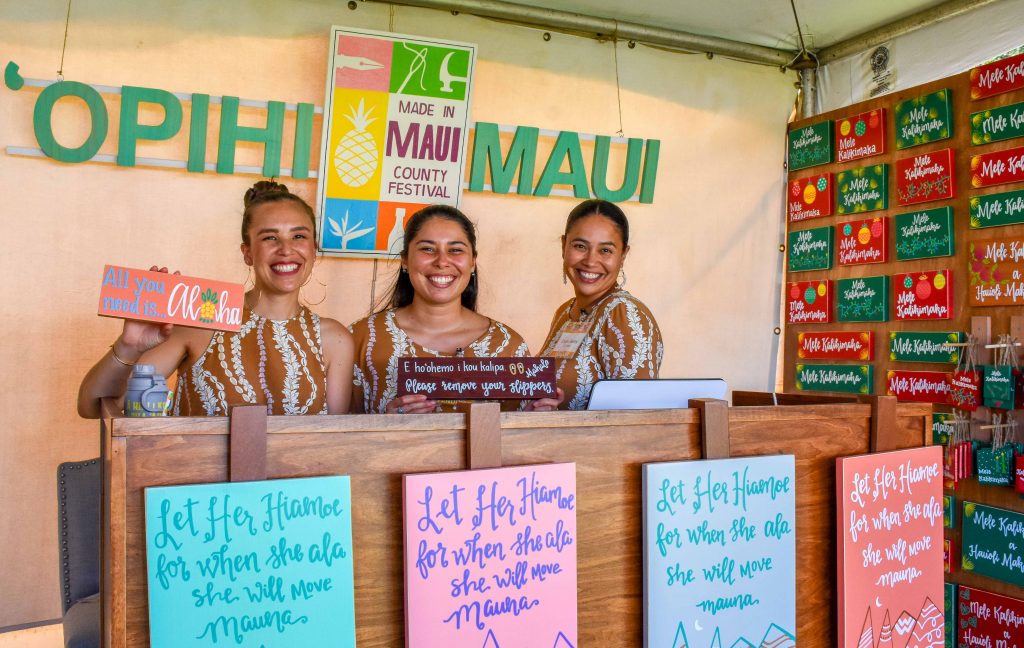
Kiani Yasak, the 35-year-old owner of ʻOpihi Maui, uses recycled wood to create homemade signs with exterior paint to make them hardy for the outdoors. She has a whole section of red and green ones that say Mele Kalikimaka (Merry Christmas).
“My dad is a painting contractor, so we ask his guys if they have scrap pieces that are going to be thrown into the dump to pile them on the side and weʻll pick them up,” she said. “We are repurposing our wood to save our ʻāina.”
ʻOpihi Maui is Yasak’s side hobby to complement her teacher’s salary at Ke Kula Kaiapuni o Kalama, an Hawaiian immersion school at Kalama Intermediate in Makawao.
“I do this late nights, weekends and on my teacher breaks and vacations,” she said. “I’m able to buy my truck and pay for gas through my business. But what we really like to do is promote ‘Ōlelo Hawaiʻi [Hawaiian language] and bring some joy and happiness to our customers through our products.”
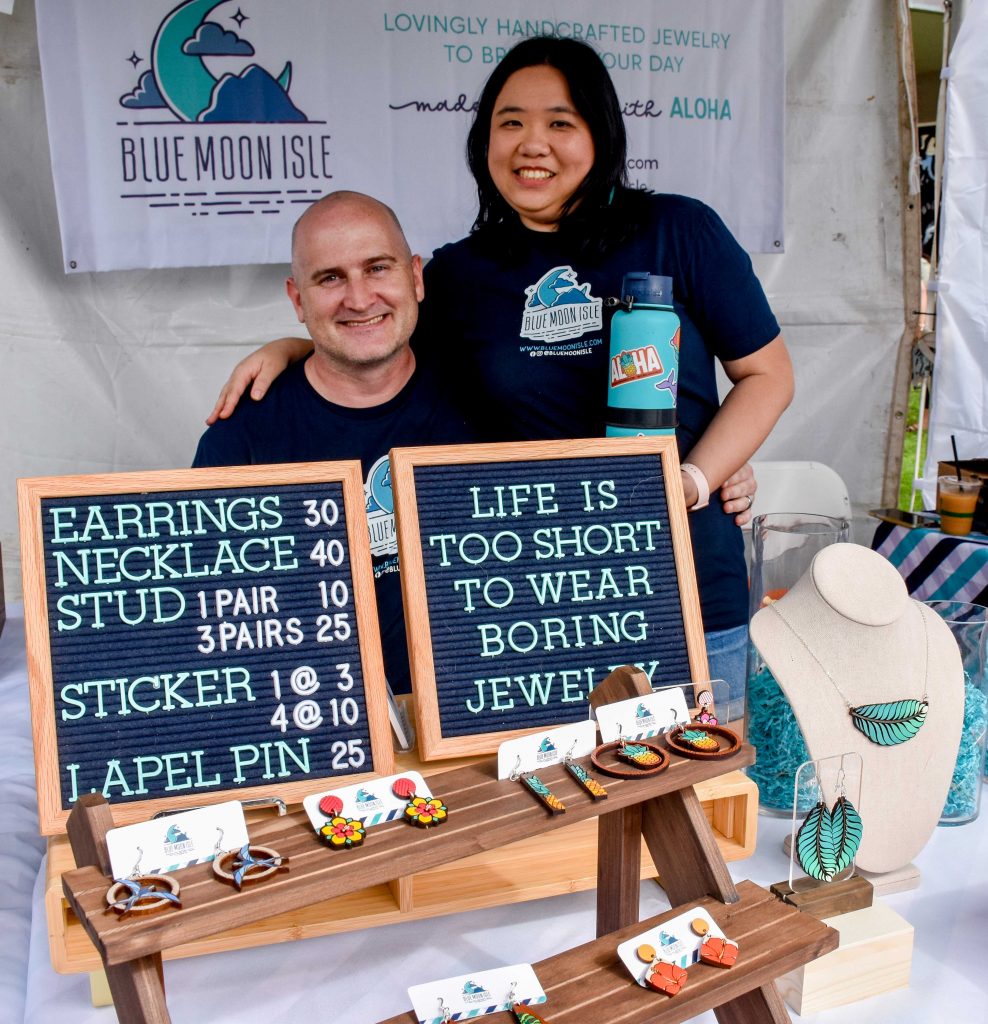
Sophie Regner, 39, also started her jewelry business “Blue Moon Isle” after losing her job doing production work for a graphic design firm during the COVID-19 pandemic.
“I was at home, doodling and stuff, and knew I needed to come up with something to do,” she said.
She uses hardwood — maple, cherry or walnut — and is experimenting with mirrored acrylic to make earrings, 3D necklaces and lapel pins that are handpainted with whimsical designs and bold colors. They lure people into their booth with a sign that says: “Life is too short to wear boring jewelry.”
She works out of a home office that gets “jumbled up and messy.” Her husband Zack Regner takes the photos for her website.
And like many businesses at the festival, she is contributing to survivors of the Maui fires, with a portion of sales from her pink items. While they now live in Wailuku and were not directly affected by the fire, the first condo the couple lived in together was in Lahaina and it burned to the ground. “We are so sad about it,” she said.
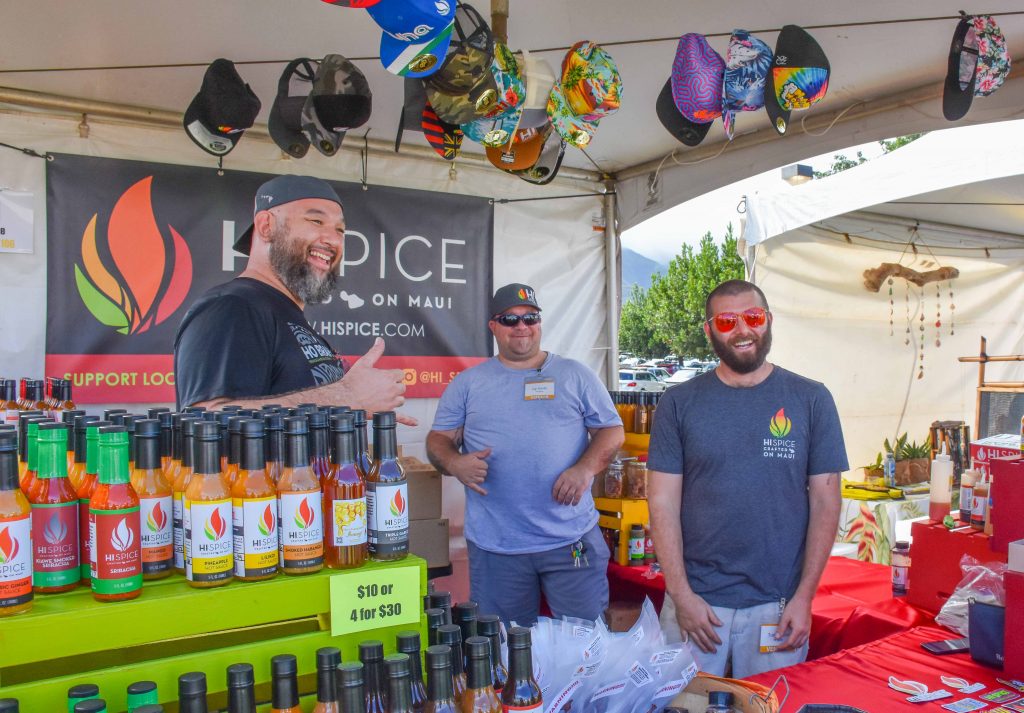
HI Spice has been doing Maui Strong boxes for three months with four bottles of hot sauce. Ten percent of the sales goes to help fire survivors, said Cy Smith, who calls himself the businessʻ “creative genius.”
It all began about eight years ago with a concoction made with mangos in “Justin’s blender.” Justin Orr, the company “saucier,” had a lot of mango trees in his backyard.
They have experimented with a variety of ingredients that are mostly sourced locally, including from multiple farmers. They use Maui Brewing Company gin in one of their specialty hot sauces.
Other products include a habanero honey, which Smith said is good on chicken wings, a Space Alien hot sauce that features UFO peppers that are shaped like flying saucers, and extremely hot Ho Brah! that is made with Trinidad Moruga scorpion peppers.
The fire destroyed three businesses where HI Spice was sold. The company is breaking into retail markets, including Mana Foods and ABC. Sometimes, the product can be found in Foodland and Times Market.
Another benefit for businesses to be in the festival is the opportunity to be seen by wholesale buyers and retail buyers. Some buyers come from the mainland, and this year there are buyers from Japan and Canada, Tumpap said.

Itʻs not easy for a Molokaʻi-based company to get exposure. It wasnʻt even easy for Fina Kaauwai, owner of Rosebuds Creations, to get to the festival. She had to round up transportation on a boat when her Mokulele flight got delayed.
She said: “Made in Maui had definitely been a vital part of getting more wholesale accounts.”
She now sells her wood earrings to two companies on the Big Island, one in Oʻahu and three on Maui, including the Kula Botanical Gardens, after making contacts at the festival.
The festival also was the opportunity for the local community and visitors to support Maui businesses.
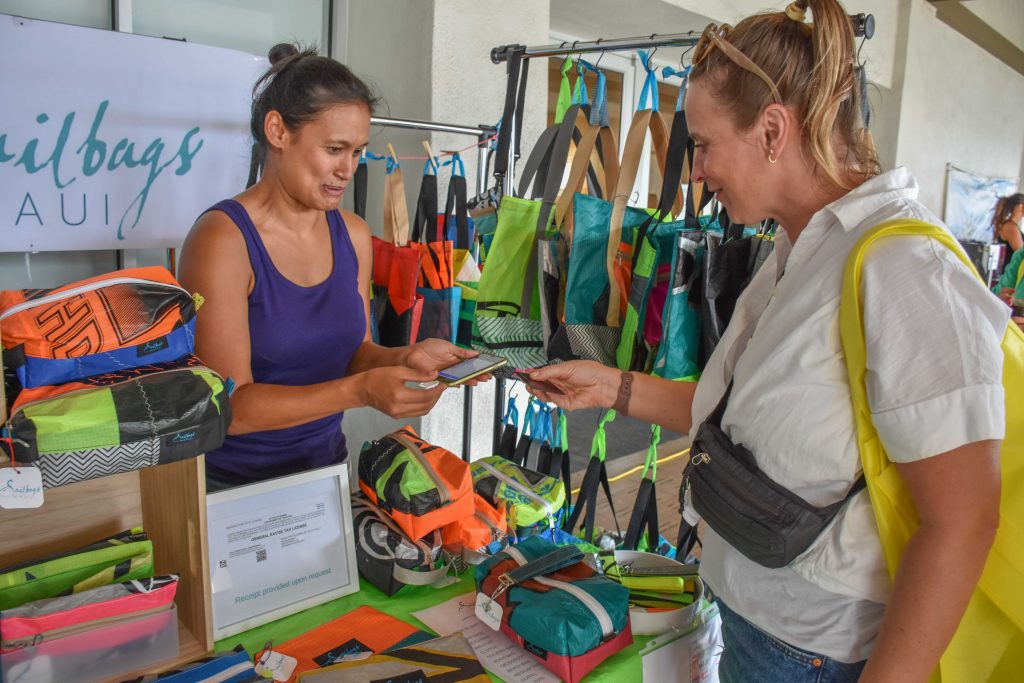
While his wife was purchasing a bag made of a repurposed kiteboard by Dava Leynes, owner, product creator and sewer of Sailbags Maui, tourist Brian Steinmetz secretly showed the gold woven bracelet he bought for her.
Steinmetz said his family was on their final day of vacation on Maui on Aug. 8, when the fires struck. He said: “My wife and I decided to come back to support Maui, which we love.”
[ad_2]
Source: Maui News




